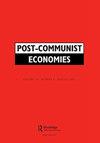Environmental conflict, renewable energy, or both? Public opinion on small hydropower plants in Serbia
IF 1.8
3区 经济学
Q2 ECONOMICS
引用次数: 20
Abstract
ABSTRACT Small hydropower plants (SHPs), despite being a renewable energy source, could have negative environmental effects. Nonetheless, many countries have promoted and subsidised them, leading to a rise in the number of environmental conflicts. How was the issue of SHPs framed in Serbia by the proponents and the opponents? How did the framing strategy change over time and why? And which factors increased attention to the topic, eventually leading a change of governmental policy? To address these questions, we analyse the Serbian mass media’s environmental framing of SHPs and conduct a content analysis of 359 articles written between 2000–2020 and published by major national online newspapers and news portals. We use the Discourse Network Analyser to demonstrate changes in framing strategies that, together with increased public pressure, contributed to a re-evaluation of the impact of SHPs and ultimately changed the government’s and the public’s standing on this issue.环境冲突、可再生能源,还是两者兼而有之?塞尔维亚小型水电站公众舆论
摘要小型水电站虽然是一种可再生能源,但可能会对环境产生负面影响。尽管如此,许多国家还是对其进行了推广和补贴,导致环境冲突的数量增加。支持者和反对者是如何在塞尔维亚提出SHP问题的?框架策略是如何随着时间的推移而变化的,为什么?哪些因素增加了人们对这个话题的关注,最终导致了政府政策的改变?为了解决这些问题,我们分析了塞尔维亚大众媒体对SHP的环境框架,并对2000年至2020年间撰写并由主要国家在线报纸和新闻门户网站发表的359篇文章进行了内容分析。我们使用话语网络分析器来展示框架策略的变化,加上公众压力的增加,有助于重新评估SHP的影响,并最终改变政府和公众在这个问题上的立场。
本文章由计算机程序翻译,如有差异,请以英文原文为准。
求助全文
约1分钟内获得全文
求助全文
来源期刊

Post-Communist Economies
ECONOMICS-
CiteScore
4.90
自引率
18.20%
发文量
21
期刊介绍:
Post-Communist Economies publishes key research and policy articles in the analysis of post-communist economies. The basic transformation in the past two decades through stabilisation, liberalisation and privatisation has been completed in virtually all of the former communist countries, but despite the dramatic changes that have taken place, the post-communist economies still form a clearly identifiable group, distinguished by the impact of the years of communist rule. Post-communist economies still present distinctive problems that make them a particular focus of research.
 求助内容:
求助内容: 应助结果提醒方式:
应助结果提醒方式:


